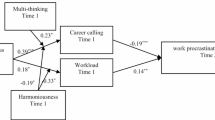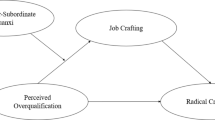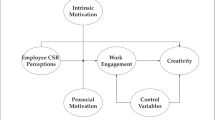Abstract
As an essential factor for sustainable business development, creative performance has received increasing attention from both management and academia. Formal status has been confirmed to affect creative performance positively, but few studies have investigated the mechanisms by which informal status affects creative performance. Based on Status Characteristics Theory, this study introduces career calling and collectivism orientation to investigate the intrinsic mechanisms and boundary conditions of the relationship between informal status and employee creative performance. By collecting paired data from 216 employees across three stages, we test our hypotheses using the hierarchical regression and bootstrap methods. Our study verifies that informal status impacts creative performance positively, that career calling partially mediates the relationship between informal status and creative performance, and that collectivism orientation positively moderates the relationship between informal status and career calling and moderates the mediating effect of career calling in this context. By constructing an integrated model of the link between informal status and creative performance, we further enrich and extend related studies.


Similar content being viewed by others
Data availability
Some or all data, models, or codes generated or used during the study are available from the corresponding author by request.
References
Anderson, C., Ames, D. R., & Gosling, S. D. (2008). Punishing hubris: The perils of overestimating one’s status in a group. Personality and Social Psychology Bulletin, 34(1), 90–101. https://doi.org/10.1177/0146167207307489
Anderson, C., Hildreth, J., & Howland, L. (2015). Is the desire for status a fundamental human motive? A review of the empirical literature. Psychological Bulletin, 141(3), 574–601. https://doi.org/10.1037/a0038781
Anderson, C., Srivastava, S., Beer, J. S., Spataro, S. E., & Chatman, J. A. (2006). Knowing your place: Self-perceptions of status in face-to-face groups. Journal of Personality and Social Psychology, 91(6), 1094–1110. https://doi.org/10.1037/0022-3514.91.6.1094
Autin, K. L., Duffy, R. D., & Allan, B. A. (2017). A focus on others and commitment to social justice. Journal of Career Assessment, 25(2), 238–253. https://doi.org/10.1177/1069072715621515
Bakker, A. B., Demerouti, E., & Dollard, M. F. (2008). How job demands affect partners’ experience of exhaustion: Integrating work-family conflict and crossover theory. Journal of Applied Psychology, 93(4), 901–911. https://doi.org/10.1037/0021-9010.93.4.901
Bellah, R. N., Madsen, R., Sullivan, W. M., Swidler, A., & Tipton, S. M. (1985). Habits of the heart: Individualism and commitment in American life. The Journal of Politics, 48(3), 743–746. https://doi.org/10.2307/2131176
Berger, J., & Conner, T. L. (1969). Performance expectations and behavior in small groups. Acta Sociological, 12(4), 186–198. https://doi.org/10.1037/0021-9010.93.4.901
Berger, J., Cohen, B. P., & Zelditch, M. (1972). Status characteristics and social interaction. American Sociological Review, 37(3), 241–255. https://doi.org/10.2307/2093465
Berger, J., Fisek, H., Norman, R. Z., & Zelditch, J. M. (1977). Status characteristics and social interaction: An expectation-states approach. Social Forces, 56(2), 742–744. https://doi.org/10.2307/2577776
Blader, S. L., & Chen, Y. R. (2012). Differentiating the effects of status and power: A justice perspective. Journal of Personality and Social Psychology, 102(5), 994–1014. https://doi.org/10.1037/a0026651
Blau, P. M. (1964). Exchange and power in social life. Wiley.
Blumberg, M., & Pringle, C. D. (1982). The missing opportunity in organizational research: Some implications for a theory of work performance. Academy of Management Review, 7(4), 560–569. https://doi.org/10.5465/amr.1982.4285240
Cattani, G., & Ferriani, S. (2008). Audiences, recognition and individual creativity: A core/periphery perspective. Organization Science, 19(6), 824–844. https://doi.org/10.1287/orsc.1070.0350
Chatman, J. A., & Barsade, S. G. (1995). Personality, organizational culture, and cooperation: Evidence from a business simulation. Administrative Science Quarterly, 40(3), 423–443. https://doi.org/10.2307/2393792
Chen, J., Wang, L., & Tang, N. (2016). Half the sky: The moderating role of cultural collectivism in job turnover among Chinese female workers. Journal of Business Ethics, 133(3), 487–498. https://doi.org/10.1007/s10551-014-2395-1
Deng, C. J., & Liu, Z. Q. (2021). A study on the mechanism of informal status influence on employees’ proactive change behavior. Management Review, 33(4), 215–224. https://doi.org/10.14120/j.cnki.cn11-5057/f.2021.04.018.
Deng, C. J., Liu Z. Q., & Wang, F. J. (2017). Informal status, mismanagement culture and employees’ innovative behavioral choices. Management Review, 29(4), 154–162. https://doi.org/10.14120/j.cnki.cn11-5057/f.2017.04.015.
Dik, B. J., & Duffy, R. D. (2009). Calling and vocation at work definitions and prospects for research and practice. Counseling Psychologist, 37(3), 424–450. https://doi.org/10.1177/0011000008316430
Dobrow, S. R. (2013). Dynamics of calling: A longitudinal study of musicians. Journal of Organizational Behavior, 34(4), 431–452. https://doi.org/10.1002/job.1808
Dobrow, S. R., & Tosti-Kharas, J. (2011). Calling: The development of a scale measure. Personnel Psychology, 64(4), 1001–1049. https://doi.org/10.1016/0195-6663(92)90014-W
Duffy, R. D., & Dik, B. J. (2013). Research on calling: What have we learned and where are we going? Journal of Vocational Behavior, 83(3), 428–436. https://doi.org/10.1016/j.jvb.2013.06.006
Earley, P. C. (1989). Social loafing and collectivism: A comparison of the United States and the people’s republic of China. Administrative Science Quarterly, 34(4), 565–581. https://doi.org/10.2307/2393567
Erdogan, B., & Liden, R. C. (2006). Collectivism as a moderator of responses to organizational justice: Implications for leader-member exchange and ingratiation. Journal of Organizational Behavior, 27(1), 1–17. https://doi.org/10.1002/job.365
Farmer, S. M., Tierney, P., & Kung-Mcintyre, K. (2003). Employee creativity in Taiwan: An application of role identity theory. Academy of Management Journal, 46(5), 618–630. https://doi.org/10.2307/30040653
Farooq, M., Farooq, O., & Jasimuddin, S. M. (2014). Employees response to corporate social responsibility: Exploring the role of employees’ collectivist orientation. European Management Journal, 32(6), 916–927.
Fiske, S. T., Cuddy, A. J. C., Glick, P., & Xu, J. (2002). A model of (often mixed) stereotype content: Competence and warmth respectively follow from perceived status and competition. Journal of Personality and Social Psychology, 82(6), 878–902. https://doi.org/10.1037/0022-3514.82.6.878
Fredrickson, B. L. (2001). The role of positive emotions in positive psychology. American Psychologist, 56(3), 218–226. https://doi.org/10.1037//0003-066x.56.3.218
Gecas, V., & Seff, M. (1990). Social class and self-esteem: Psychological centrality, compensation, and the relative effects of work and home. Social Psychology Quarterly, 53(2), 165–173. https://doi.org/10.2307/2786677
Hall, D. T., & Chandler, D. E. (2005). Psychological success: When the career is a calling. Journal of Organizational Behavior, 26(2), 55–176. https://doi.org/10.1002/job.301
Hayes, A. F. (2014). Introduction to mediation, moderation, and conditional process analysis: A regression-based approach. The Guilford Press.
Hirschi, A., & Herrmann, A. (2013). Calling and career preparation: Investigating developmental patterns and temporal precedence. Journal of Vocational Behavior, 83(1), 51–60. https://doi.org/10.1016/j.jvb.2013.02.008
Hobfoll, S. E. (1989). Conservation of resources. A new attempt at conceptualizing stress. American Psychologist, 44(3), 513–524. https://doi.org/10.1037//0003-066x.44.3.513
Hofstede, G. (1980). Motivation, leadership, and organization: Do American theories apply abroad? Organizational Dynamics, 9(1), 42–63. https://doi.org/10.1016/0090-2616(80)90013-3
Hu, Q. J., Yang, S. Y., Qin, X., & Wang, S. (2016). Can informal status facilitate advocacy behavior? --An exploration based on status characteristics theory. Management Quarterly, 1(3), 60–80. CNKI:SUN:PZDG.0.2016–03–006.
Hwang, K. (2010). Chinese relationism: Theoretical construction and methodological considerations. Journal for the Theory of Social Behaviour, 30(2), 155–178. https://doi.org/10.1111/1468-5914.00124
Jackson, C. L., Colquitt, J. A., Wesson, M. J., & Zapata-Phelan, J. (2006). Psychological collectivism: A measurement validation and linkage to group member performance. Journal of Applied Psychology, 91(4), 884–899. https://doi.org/10.1037/0021-9010.91.4.884
Janssen, O., & Yperen, N. W. V. (2004). Employees’ goal orientations, the quality of leader-member exchange, and the outcomes of job performance and job satisfaction. Academy of Management Journal, 47(3), 368–384. https://doi.org/10.5465/20159587
Kahn, R. L., Wolfe, D. M., Quinn, R. P., Snoek, J. D., & Rosenthal, R. A. (1964). Organizational stress: Studies in role conflict and ambiguity. American Journal of Sociology, 10(1), 125–129. https://doi.org/10.2307/2091375
Karakowsky, L., Kotlyar, I., & Good, J. (2020). Identifying the double-edged sword of stardom: High-status and creativity in the context of status instability. The Journal of Creative Behavior, 55(3), 723–737. https://doi.org/10.1002/jocb.486
Li, F., Jiao, R., Yin, H., & Liu, D. (2021). A moderated mediation model of trait gratitude and career calling in Chinese undergraduates: Life meaning as mediator and moral elevation as moderator. Current Psychology. https://doi.org/10.1007/s12144-021-01455-7
Lin, B., Law, K. S., & Zhou, J. (2017). Why is underemployment related to creativity and OCB? A task-crafting explanation of the curvilinear moderated relations. Academy of Management Journal, 60(1), 156–177.
Liu, Z. Q., Li, C., Liao, J. Q., & Long, L. R. (2015). Organizational status, status giving and employee creative output: An empirical study from state-owned enterprises and public institutions. Management World, 3, 86–101. 187-188. CNKI:SUN:GLSJ.0.2015-03-011.
Luksyte, A., Bauer, T. N., Debus, M. E., Erdogan, B., & Wu, C. H. (2022). Perceived overqualification and collectivism orientation: Implications for work and nonwork outcomes. Journal of Management, 48(2), 319–349. https://doi.org/10.1177/0149206320948602
Magee, J. C., & Galinsky, A. D. (2008). Social hierarchy: The self-reinforcing nature of power and status. The Academy of Management Annals, 2(1), 351–398. https://doi.org/10.5465/19416520802211628
Nembhard, I. M., & Edmondson, A. C. (2006). Making it safe: The effects of leader inclusiveness and professional status on psychological safety and improvement efforts in health care teams. Journal of Organizational Behavior, 27(7), 941–966. https://doi.org/10.1002/job.413
Pieterse, A. N., Knippenberg, D. V., Schippers, M., & Stam, D. (2010). Transformational and transactional leadership and innovative behavior: The moderating role of psychological empowerment. Journal of Organizational Behavior, 31(4), 609–623. https://doi.org/10.1002/job.650
Praskova, A., Creed, P. A., & Hood, M. (2015). The development and initial validation of a career calling scale for emerging adults. Journal of Career Assessment, 23(1), 91–106. https://doi.org/10.1177/1069072714523089
Preacher, K. J., & Hayes, A. F. (2004). SPSS and SAS procedures for estimating indirect effects in simple mediation models. Behavior Research Methods, Instruments and Computers, 36(4), 717–731. https://doi.org/10.3758/bf03206553
Ren, H., Zhang, Q., & Zheng, Y. (2021). Impact of work values and knowledge sharing on creative performance. Chinese Management Studies, 15(1), 86–98. https://doi.org/10.1108/CMS-08-2019-0287
Ryan, R. M., & Deci, E. L. (2008). Self-determination theory and the role of basic psychological needs in personality and the organization of behavior (pp. 654–678). Theory and Research, Guilford Press, New York.
Shalley, C. E., Zhou, J., & Oldham, G. R. (2004). The effects of personal and contextual characteristics on creativity: Where should we go from here? Journal of Management, 30(6), 933–958. https://doi.org/10.1016/j.jm.2004.06.007
Smith, P. K., & Magee, J. C. (2015). The interpersonal nature of power and status. Current Opinion in Behavioral Sciences, 3, 152–156. https://doi.org/10.1016/j.cobeha.2015.04.007
Tangirala, S., & Ramanujam, R. (2008). Employee silence on critical work issues: The cross level effects of procedural justice climate. Personnel Psychology, 61(1), 37–68. https://doi.org/10.1111/j.1744-6570.2008.00105.x
Torelli, C. J., Leslie, L. M., Stoner, J. L., & Puente, R. (2014). Cultural determinants of status: Implications for workplace evaluations and behaviors. Organizational Behavior and Human Decision Processes, 123(1), 34–48. https://doi.org/10.1016/j.obhdp.2013.11.001
Triandis, H. C. (1995). Individualism and collectivism. Westview Press.
Wang, H., Lu, G., & Liu, Y. (2015). Ethical leadership and loyalty to supervisor in China: The roles of interactional justice and collectivistic orientation. Journal of Business Ethics, 146(3), 1–15. https://doi.org/10.1007/s10551-015-2916-6
Wen, Z., Chang, L., Hau, K.-T., & Liu, H. (2004). Testing and application of the mediating effects. Acta Psychologica Sinica, 5, 615–620.
Wrzesniewski, A., & Dutton, J. E. (2001). Crafting a job: Revisioning employees as active crafters of their work. Academy of Management Review, 26(2), 179–201. https://doi.org/10.2307/259118
Yang, C., Yang, F., Jing, Y., & Tang, M. F. (2018). How humble leaders improve employee performance: The mediating role of psychological need satisfaction and the moderating role of work unit structure. Nankai Management Review, 21(2), 121–134. 171. CNKI:SUN:LKGP.0.2018-02-013.
Zhang, X., & Bartol, K. M. (2010). The influence of creative process engagement on employee creative performance and overall job performance: A curvilinear assessment. Journal of Applied Psychology, 95(5), 862–873. https://doi.org/10.1037/a0020173
Zhou, J., Wang, X. M., Bavato, D., Tasselli, S., & Wu, J. (2019). Understanding the receiving side of creativity: A multidisciplinary review and implications for management research. Journal of Management, 45(6), 2570–2595. https://doi.org/10.1177/0149206319827088
Acknowledgements
All authors sincerely thank the reviewers and editors for their enthusiastic and patient work during the review procedure.
Funding
This work was supported by Humanities and Social Science Fund of Ministry of Education of China (Grant numbers 21YJA630118) and National Social Science Fund of China (Grant numbers 22BGL133).
Author information
Authors and Affiliations
Contributions
All authors contributed to the study conception and design. All authors were involved in the conception and design of the study. Material preparation, data collection and analysis were done by Wei He and Ran Li. The first draft of the manuscript was written by Zheng Zhang and Wei He, and all authors commented on previous versions of the manuscript. All authors read and approved the final manuscript.
Corresponding author
Ethics declarations
Conflict of interest
The author declares that there are no potential conflicts of interest with respect to the research, authorship, and/or publication of this article.
Ethical approval
All procedures performed in studies involving human participants were in accordance with the ethical standards of the institutional and/or national research committee and with the 1964 Helsinki Declaration and its later amendments or comparable ethical standards. The study was approved by the Bioethics Committee of Shanxi University of Finance and Economics.
Consent to participate
All participants gave informed consent.
Consent for publication
We will grant the Publisher an exclusive license to publish the article.
Additional information
Publisher's Note
Springer Nature remains neutral with regard to jurisdictional claims in published maps and institutional affiliations.
Supplementary Information
Below is the link to the electronic supplementary material.
Rights and permissions
Springer Nature or its licensor (e.g. a society or other partner) holds exclusive rights to this article under a publishing agreement with the author(s) or other rightsholder(s); author self-archiving of the accepted manuscript version of this article is solely governed by the terms of such publishing agreement and applicable law.
About this article
Cite this article
Zhang, Z., He, W. & Li, R. The effect of informal status on employee creative performance: a moderated mediation model. Curr Psychol 42, 28320–28331 (2023). https://doi.org/10.1007/s12144-022-03973-4
Accepted:
Published:
Issue Date:
DOI: https://doi.org/10.1007/s12144-022-03973-4




